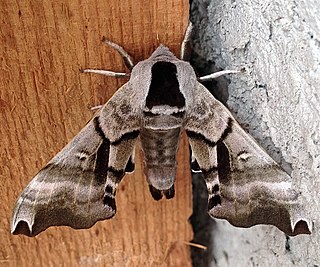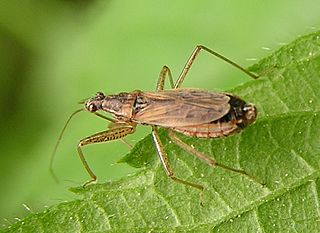
Harpalinae is a subfamily of ground beetles that contains more than 3,000 species in 4 tribes worldwide, according to the Carabcat Database. A rarely used common name for the subfamily is the harp beetles. The Harpalinae contain the most apomorphic ground beetles, displaying a wide range of forms and behaviors. Some are, rare among ground beetles, omnivores or even herbivores.

William Kirby was an English entomologist, an original member of the Linnean Society and a Fellow of the Royal Society, as well as a country rector, so that he was an eminent example of the "parson-naturalist". The four-volume Introduction to Entomology, co-written with William Spence, was widely influential.

Smerinthus cerisyi, the one-eyed sphinx or Cerisy's sphinx, is a moth of the family Sphingidae. The species was first described by William Kirby who named the species in honor of Alexandre Louis Lefèbvre de Cérisy in 1837.

Cryptophagidae is a family of beetles with representatives found in all biogeographic realms. Members of this family are commonly called silken fungus beetles and both adults and larvae appear to feed exclusively on fungi although in a wide variety of habitats and situations, such as rotting wood and shed animal fur and feathers. These beetles vary from about 1 to 11 millimeters long, and usually have an oval body shape with a slight "waist".

The brown-tailed mongoose, brown-tailed vontsira, Malagasy brown-tailed mongoose, or salano is a species of mammal in the family Eupleridae. It is endemic to Madagascar. Its natural habitat is moist lowland tropical forest. It is threatened by habitat loss.

Nabis is a genus of damsel bugs in the family Nabidae.

Cymindis is a genus of ground beetle native to the Palearctic, the Near East, and North Africa. It contains the following species:

Melanophila is a genus of buprestid beetles commonly known as fire beetles. They have extraordinary sensitivity to infrared radiation (heat), using a specialized sensor organ near their legs.

Dicerca is a genus of beetles in the family Buprestidae. It contains the following species:

Nebriinae is a subfamily of ground beetles in the family Carabidae. There are about 12 genera and more than 840 described species in Nebriinae.

Bicyclus sambulos, the tailed bush brown, is a butterfly in the family Nymphalidae. It is found in Sierra Leone, Liberia, Ivory Coast, Ghana, Nigeria, Cameroon, Gabon, the Central African Republic, the Democratic Republic of the Congo, Uganda and Tanzania. The habitat consists of dense primary forests.

Neoclytus is a genus of beetles in the family Cerambycidae. They measure 4-20 mm. There are 93 species in the New World.
Cymindis alternans is a species of ground beetle in the subfamily Harpalinae. It was described by Rambur in 1837.

The Pericopina is a subtribe of tiger moths in the family Erebidae. The subtribe was described by Francis Walker in 1869.

Sphaerocoris is a genus of shield-backed bugs belonging to the family Scutelleridae.

Lebiini is a tribe of ground beetles in the family Carabidae. There are more than 250 genera and 4,800 described species in Lebiini.














